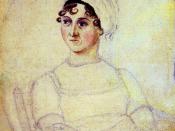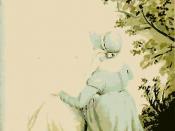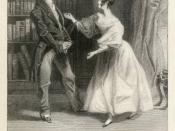Irony is the art of expressing two meanings simultaneously; the obvious surface meaning the majority will regard as the only meaning and on a deeper profounder meaning which lies behind the obvious.
The tension created by this ambivalence can be and has been put to a variety of uses. Ironies abound in Shakespeare, so do they in Dryden and Poe.Shakespeare employs them to underscore the tragic plight of a man, while Dryden and Pope use them to mock at human follies and foibles.among the forty eight writings, Fanny urney's 'Cecilia','Comilla' and other novels are based on quiet but incisive irony. Thomas Love Peacocks "Headlong Hall", "Nightmare Abbey',"Maid Marian" and so on are the vehicles of attacks on the cranks and the fads of his day.but very few writers have exploited all possible resources of irony as Jane Austen.It may not be an exaggeration to say that Jane Austen is nothing if not ironical.
Irony is her very forte;it is in fact the very soul of her art.
Pride and Prejudice, for instance, is steeped in irony.To put it in other words, it is an artistic blend of ironic
and dramatic design.almost everything in this novel, be it related to the context or to the style, points to an
ironic contrast between 'appearance' and 'reality'.it is the complex handling of "First Impressions" that
lends to Austen's irony.
Perhaps the opening sentence of the book offers the aptest illustration of irony.It states that "'a single man
in possesion of a good fortune, must be in want of a wife" and claims that "it is truth universally acknowledged." But as the story unfolds itself we learn that "universal truth lies" in the opposite direction. Mrs Bennet's concern for getting her daughters gainfully husbanded constitutes the basic theme of...


